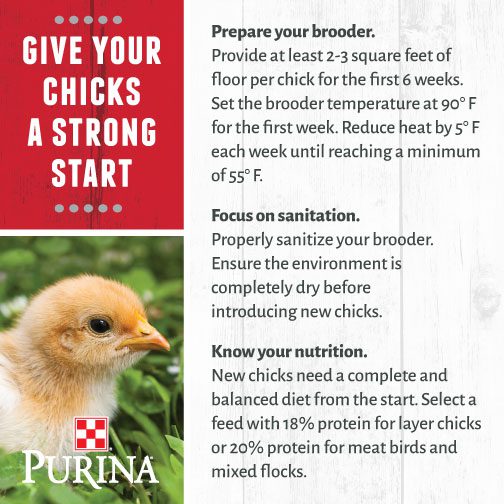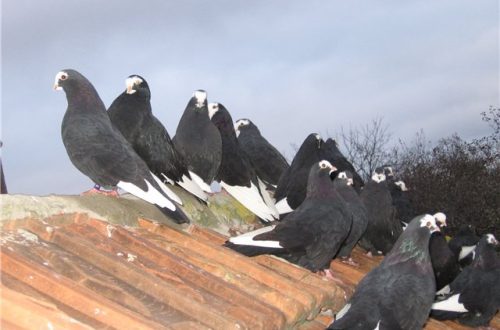
What and how to feed chickens: care for day old chicks and useful advice from experienced poultry farmers
When caring for and breeding laying chicks, many poultry farmers make mistakes in the feeding process, which often leads to the death of babies. Proper feeding and care are the main factors influencing the further development and growth of chickens. Using only feed grains or food waste as feed should not be expected in the future for a good result. Therefore, the question often arises: what to feed the chickens in the first days, so that later they grow up strong and healthy?
Contents
Feeding chickens at home
Chickens that have just hatched from an egg do not yet know how to eat on their own. The yolk sac retains a small supply of vital elements, which should last them for several hours.
After that, a feeder is placed in front of them, and the chicks learn to peck the food themselves. The basic rule when feeding chickens at home is observe the regime and menubased on their age.
Basically, babies are fed the following foods:
- Feed.
- Corn.
- Dairy.
- Greenery.
- Vitamins.
General recommendations for proper feeding of chickens:
- Feeders should be filled only one-third so that the food is not trampled heavily.
- All chicks should be well fed. If suddenly several babies begin to rarely approach their feeder, they should be planted and fed with a mixture of milk and pounded egg yolk with a pipette. After they get stronger, they are planted back to their brethren.
- The room should always have fresh water, which is regularly updated.
- To prevent diseases, chicks should be given a saturated solution of potassium permanganate three times a week.
- The feeder should be cleaned and disinfected regularly using hot soapy water or a 5% formalin solution. Feed residues should always be removed to prevent rotting.
How to feed newly hatched chicks
It has been scientifically proven that the faster the chick learns to peck food on its own, the better and faster its digestive system will form. As soon as the baby eats a grain in the very first hours of his life, immediately his brain will fix the feeding reflex. If several hours have passed since hatching and the baby has not touched the food, nutritional deficiencies occur, organs begin to develop poorly, and serious disorders can subsequently occur.
Thus, chickens should be fed as soon as they are born. Having dried and strengthened, they begin to stand on their legs and should already be trying to peck something. In a flat feeder or just at the bottom of the box, they pour a little corn grits. It is small in itself, so it is well suited for newborn chicks.
Around the egg yolk there is a debate about whether to give it to newly hatched chickens. Some poultry farmers are sure that a hard boiled and chopped yolk brings only benefits. Others claim that he is too fat for such babies.
Veterinarians adhere to the latter point of view. According to them, such food does not load on the stomach muscles of a newborn chicken. Because of this, the formation and structure of its walls does not occur properly. If, after such soft food, the chicks are given the roughage they need, stomach upset often occurs.
Also, because of the yolk, pathogenic microflora multiplies in the intestinal system of the chicks. In addition, along with the yolk, the growing body receives too much fat.
How to feed daily chicks
The diet of day old chicks is already a little more varied. In addition to corn grits, they can already be given:
- semolina;
- barley groats;
- millet;
- ground oatmeal;
- wheat groats.
Day-old chicks are fed every two hours in small portions so that they do not scatter it. If you give a mixture of different cereals, some chicks may begin to choose the food they like. Therefore, it is better not to mix cereals, but to give separately. At the same time, porridge is not steamed, but given dry.
In order for babies to grow and develop normally, cereals alone are not enough for them. You should gradually introduce other foods into the diet. Highly cottage cheese is considered useful, thanks to which the body of the chicken is saturated with nitrogenous substances and calcium. You can give it to two-three-day-old chickens, preferably in the morning and mixing with cereals.
Any dairy products benefit babies. Can be poured into a drinking bowl instead of water liquid kefir or fresh serum. Yogurt will provide the chicken with probiotics, and besides, they eat it with pleasure.
On the third day, the chicks you can eat greens. It can be plantain, dandelion, nettle, midge, clover. Green onions are very useful – they protect the body from intestinal diseases. It is administered only on the fifth day.
If the chickens are broiler, then for 4-5 days they are recommended to give special compound feed. It contains essential vitamins and minerals for rapid growth and weight gain.
What to feed week old chicks
week old chicks give a mixture from corn, barley, oatmeal and wheat groats in a ratio of 1:1. Supplement food with greens and dairy products. During this period, the chicks need to be fed less often, but in large portions. Thus, 4-5 feedings are obtained per day.
What to feed monthly chicks
Monthly chicks should already be released for walking, so their diet is mainly greens. By using grass and other greenery, they will receive the vitamins necessary for their growing body. At this age, laying hens are introduced to the diet of coarse grain. At a month and a half, they should already be eating whole grains. You can give bone meal and food waste.
It is worth taking care of a separate feeder with fine gravel, sand or ground shells. They well support the body of chickens in a normal balance. If at home it is correct to feed the chicks, then they grow fast and don’t get sick.





